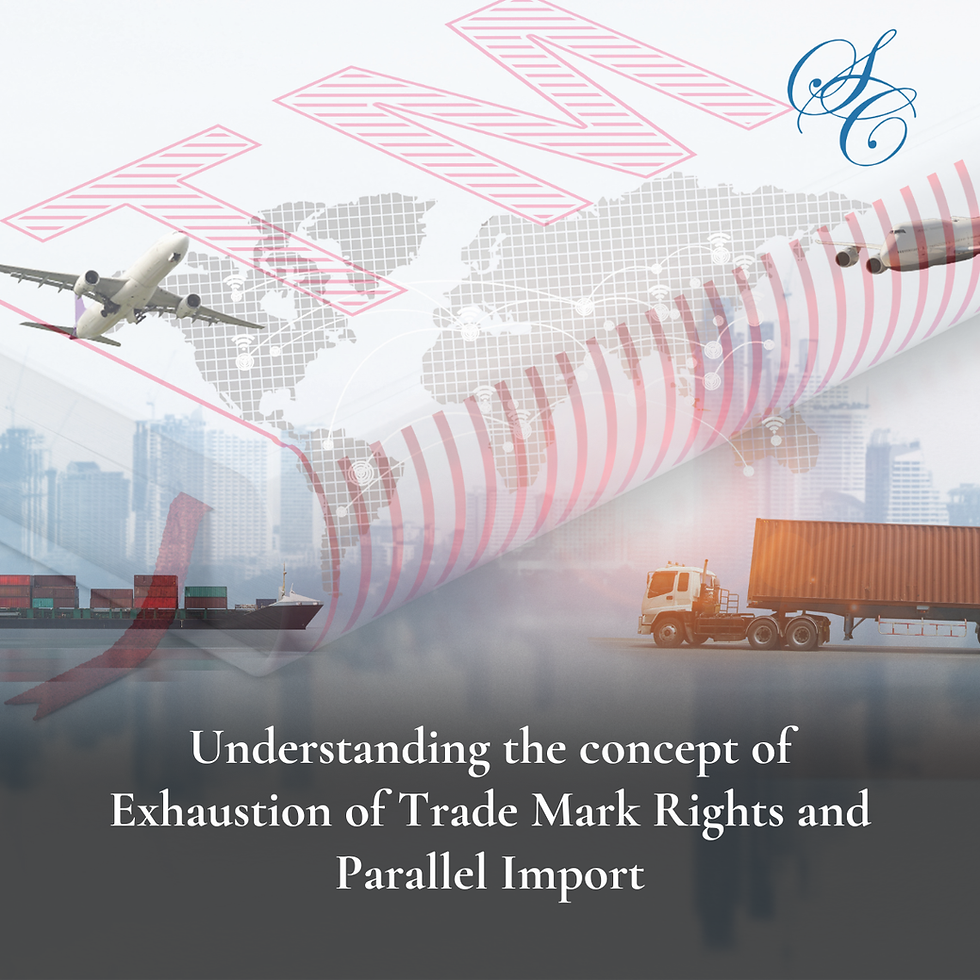Madras High Court Sets Aside Injunction Order Against Patajali Ayurved
- Sarwajeet Singh
- Mar 10, 2021
- 3 min read
Our Associate, Tanvi Srivastava discusses “Madras High Court Sets Aside Injunction Order Against Patanjali Ayurved”
Recently, the Madras High Court set aside an order of interim injunction granted to Arudra Engineers Pvt. Ltd. (“Respondent/Plaintiff) against Patanjali Ayurveda Ltd. and Divya Yog Mandir Trust (“Appellant/Defendant”) in relation to the Appellant/Defendant’s use of the mark CORONIL for tablets to prevent Covid-19 infection.
In the first instance, the Respondent/Plaintiff had argued that the Appellant/Defendant’s use of the mark CORONIL for tablets is liable to be restrained under Section 29 (4) of the Trade Marks Act, 1999 (hereinafter the “Act”) because such use is without due cause and detrimental to the reputation of the Respondent/Plaintiff’s registered trade marks.
In the appeal, counsel for the Appellant/Defendant contended that the rival goods of the respective parties were dissimilar and covered in two different classes of Nice Classification viz. Class 1 and 5, respectively. While the Respondent/Plaintiff’s product was a chemical agent that was used to sanitise and clean heavy industrial machinery with minimum corrosion, the Appellant/Defendant was selling medicinal tablet which served as an immunity booster to prevent Covid-19 infection. Counsel for the Appellant/Defendant further contended that owing to the dissimilarity of the rival goods, the Respondent/Plaintiff must satisfy all the essentials of the Section 29 (4) of the Act in order to make out a case for grant of injunctions.
As per the Appellant/Defendant, the rival marks were not similar since the Respondent/Plaintiff had registration for the composite mark (shown below) (comprising of the three elements, namely, (a) droplet symbol with capital letter “A” inscribed therein, (b) the name ‘CORONIL’ and (c) alpha numerals, namely, “92 B” and “213 SPL” across a black background) and not on the individual components.

On the other hand, the Appellant/Defendant were using the word mark CORONIL.
According to the court, the first question that required consideration was whether Section 29 (4) of the Act could have been invoked by the Respondent/Plaintiff in this case or not. The court observed that the Respondent/Plaintiff had neither applied for nor registered the word “CORONIL” as a word mark even though it was an invented word and a prima facie distinctive word. Instead, the Respondent/Plaintiff had registered the composite mark, consisting of a device element, word “CORONIL” and alpha numerals, namely, “92 B” and “213 SPL”.
Counsel for the Respondent/Plaintiff contended that the Respondent/Plaintiff has disclaimed rights in the alpha numerals, namely, “92 B” and “213 SPL” before the Registry. Therefore, the Respondent/Plaintiff has exclusive monopoly over the remaining word, namely, CORONIL. It follows that the Respondent/Plaintiff is entitled to invoke their statutory rights under the Act.
However, refuting the contentions of the counsel for the Respondent/Plaintiff, the court observed that the Respondent/Plaintiff cannot claim exclusive rights and monopoly on any part of the composite mark unless each element and/or the part of the composite mark is subject of separate application/registration as per Section 17 of the Act. According to the court, protection is only afforded to the entire trade mark as registered, and not to mere parts of the trade mark. In the instant case, registration has been obtained by the Respondent/Plaintiff over the label with the words and alpha numeral CORONIL 92B and CORONIL 213 SPL as a composite mark and not as a word for “CORONIL” as envisaged under Section 15 of the Act.
Emphasizing the settled position of law, the court observed that when each part of a label mark is capable of being individually registered, it cannot be dissected and split up into its component parts for a grant of injunction. It further clarified that the position would have been different if the Respondent/Plaintiff had obtained a registration for the word “CORONIL” or any other word which was phonetically similar or identical with the aforesaid word.
Consequently, based on the aforesaid findings and observation, the court held that the Respondent/Plaintiff had failed to establish a prima facie case for the purpose of grant of interim relief under Section 29(4) of the Act and, set aside the order passed by the learned single judge.
Citation: Patanjali Ayurveda Ltd. & Anr. v. Arudra Engineers Pvt. Ltd., O.S.A No. 169 of 2020, decision dt. February 2, 2021 by Madras High Court.




Comments